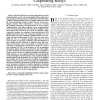Free Online Productivity Tools
i2Speak
i2Symbol
i2OCR
iTex2Img
iWeb2Print
iWeb2Shot
i2Type
iPdf2Split
iPdf2Merge
i2Bopomofo
i2Arabic
i2Style
i2Image
i2PDF
iLatex2Rtf
Sci2ools
120
click to vote
TSP
2010
2010
Improving wireless physical layer security via cooperating relays
Physical (PHY) layer security approaches for wireless communications can prevent eavesdropping without upper layer data encryption. However, they are hampered by wireless channel conditions: absent feedback, they are typically feasible only when the source-destination channel is better than the source-eavesdropper channel. Node cooperation is a means to overcome this challenge and improve the performance of secure wireless communications. This paper addresses secure communications of one source-destination pair with the help of multiple cooperating relays in the presence of one or more eavesdroppers. Three cooperative schemes are considered: decode-and-forward (DF), amplify-and-forward (AF), and cooperative jamming (CJ). For these schemes, the relays transmit a weighted version of a reencoded noise-free message signal (for DF), a received noisy source signal (for AF), or a common jamming signal (for CJ). Novel system designs are proposed, consisting of the determination of relay weight...
Related Content
| Added | 22 May 2011 |
| Updated | 22 May 2011 |
| Type | Journal |
| Year | 2010 |
| Where | TSP |
| Authors | Lun Dong, Zhu Han, Athina P. Petropulu, H. Vincent Poor |
Comments (0)

